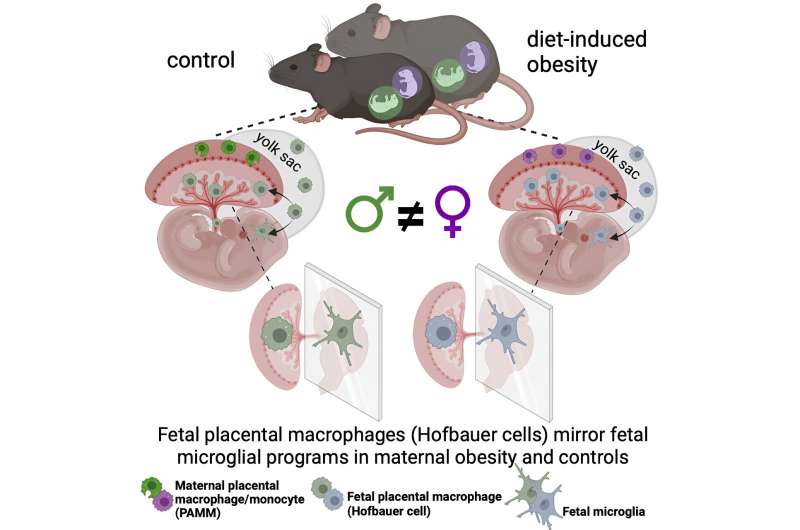This article has been reviewed according to Science X's editorial process and policies. Editors have highlighted the following attributes while ensuring the content's credibility:
fact-checked
peer-reviewed publication
trusted source
proofread
Testing immune cells in the placenta may indicate the health of fetal brain immune cells

Immune activation in a pregnant woman can have negative effects on the development of fetal brain microglia—or macrophage immune cells in the brain—and even lead to neurodevelopmental disorders in newborns.
It's not possible to monitor how microglia are developing within the fetal brain, but new research indicates that the health of fetal macrophages in the placenta can act as an indicator of the health of fetal brain microglia.
The research was led by investigators from Massachusetts General Hospital and is published in Cell Reports.
"If we can use fetal placental macrophages as a surrogate cell type or biomarker for fetal brain microglial programming, we have the opportunity to identify those children at greatest risk from in utero immune-activating exposures. Identifying these children early creates the potential to intervene during key developmental windows to ameliorate the impact of those pregnancy exposures," said senior author Andrea Edlow, MD MSc, an associate professor of Obstetrics, Gynecology, and Reproductive Biology, and a Maternal-Fetal Medicine specialist at Massachusetts General Hospital. Dr. Edlow is also an MGH Research Scholar.
Examples of immune-activating exposures during pregnancy include bacterial and viral infections, metabolic inflammation from obesity and diabetes, environmental toxins and maternal stress. Edlow and her colleagues assessed placental macrophages in a mouse model of maternal diet-induced obesity.
Single-cell RNA sequencing of mouse fetal placental macrophages (or Hofbauer cells) revealed similar gene expression signatures as fetal brain microglia during normal conditions and also in response to maternal diet-induced obesity.
Interestingly, the sex of the fetus impacted how maternal obesity affects the placenta and the fetal brain. Specifically, male placental macrophages and fetal brain microglia had a greater number of genes dysregulated by maternal obesity and more neuroinflammatory signaling than female cells.
When the investigators compared their mouse data with published human datasets, they found conserved gene expression patterns in placental macrophages in mice and humans, suggesting that their findings in mice may have clinical implications in humans.
"This work is a promising start for using fetal placental macrophages as a biomarker for fetal brain microglial programming in a variety of maternal exposures, and it could form the basis for creating personalized fetal models of neurodevelopment using cells from the placenta that are easily accessible at birth," said Edlow.
More information: Rebecca Batorsky et al, Hofbauer cells and fetal brain microglia share transcriptional profiles and responses to maternal diet-induced obesity, Cell Reports (2024). DOI: 10.1016/j.celrep.2024.114326
















